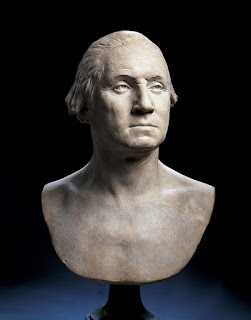When I was growing up, George
Washington was a remote figure to me. He was the stern-looking fellow on the
dollar bill with the powdered wig and pursed lips. I could never figure out why
his contemporaries like Jefferson, Adams, Franklin and Hamilton - men who had a
sizable regard for their own abilities – regarded him as the greatest of them
all.
I also never bought into his
modesty act whenever opportunity came calling. Every time he was asked to lead
the army, or preside over the Constitutional convention, or become our first
president, he'd say, "Gee, guys. I really hate to leave Mount Vernon, but
if you insist, well, OK." And I'd always think, "Who does this guy
think he's kidding?"
Then, one day, I visited Mount
Vernon. And I realized in a flash: He wasn't kidding at all. If I lived at
Mount Vernon, I'd never want to leave there, either. It's the most beautiful
place I've ever seen.
The Washington Monument is across
the river in the middle of the National Mall. But his real monument is Mount
Vernon.
Unlike Thomas Jefferson's home,
Monticello, it's not an aristocrat's house. It's a farmer's house. But it's a
very elegant farmer's house.
In the parlor is the harpsichord
his granddaughter Nelly Custis (after whom I named one of my cats), used to
play for him. And hanging in a glass case in the main hallway, as it has ever
day since 1789 – except once, when it was sent to Paris in 1989 to be part of
the celebration of the 200th anniversary of the French Revolution -
is the key to the Bastille, a gift from Lafayette.
But to get to my second question,
which is why all those other heavyweights looked up to him so much, the answer
isn't that he beat the most powerful empire in the world with a ragtag army. Or
that he basically invented the office of the presidency.
It's because having won the war,
he did something that no conquering general in history – not Ceasar, not
Cromwell, not Napoleon – had ever done: He went home. All the others seized
power and made themselves dictators.
The date was March 15, 1783. The
place: Newburgh, New York. The soldiers hadn't been paid all throughout the
war, and now Congress was reneging on its promise to pay them when the fighting
was over.
Two hundred of the most senior
officers gathered at Newburgh to plot a coup d'etat. They'd march on
Philadelphia, arrest the members of Congress, and set up a military
dictatorship.
Suddenly, there was a knock on
the door. They opened it, and there stood Washington himself, who asked for
permission to address them.
He began to read them a letter
from a Congressman, then he did something they had never seen him do before. He
reached into his pocket and put on a pair of eyeglasses.
"Gentlemen, you will permit
me to put on my spectacles, for I have not only grown gray but almost blind in
the service of my country," he explained.
He started to walk toward the
door, but by the time he got there every man in the room was sobbing like a
baby. The coup d'etat was over. And our democracy was born.
Thanks, George. Happy birthday.














No comments:
Post a Comment